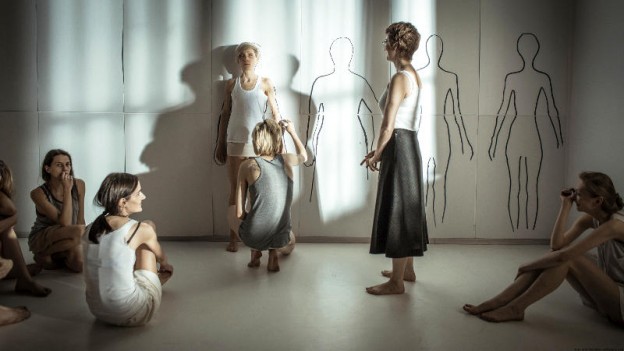ein Film von Małgorzata Szumowska.
„Body“ / „Cialo“ / “Körper“: Der Titel benennt sehr konkret das Thema des Films.
Malgorzata Szumowska setzt „Body“ schmerzhaft direkt um und läßt gleichzeitig Raum für die Sehnsucht nach Unvergänglichkeit, um dem Verlust geliebter Menschen standhalten zu können. Sie tut das so sensibel und charmant, wie sie in ihrem vorletzten Film „Im Namen des…“ den festgebrannten Bodensatz der polnischen Gesellschaft namens Katholizismus auf eine völlig selbstverständliche Art hopsnahm & suspendierte.
„Kommst du mit in den Alltag?“ ist eine Tradition des polnischen Kinos und steht mit Janusz Gajos wieder auf, der als Untersuchungsrichter an die Tatorte von Gewaltverbrechen gerufen wird und die Grausamkeit der Realität in nüchterne Protokolle übersetzt. Seine magersüchtige Tochter Olga provoziert ihn, drückt ihn in die Ecke, er weicht aus und verdrängt die Ursachen des Todesfalls in der Familie. Die dritte Person des Films, Olgas Therapeutin Anna, kann und will beiden helfen, aber steht sich selbst ratlos gegenüber. Gleichzeitig spiegeln sich bei ihr die Brechungen des gesellschaftlichen Umbruchs bei gleichzeitiger Kontinuität besonders stark wider.
Fazit: Nach Jahren anstrengender, kleinkrimineller, glatzköpfiger Bengel hat der polnische Film mit „Kleine Tricks“, „In meinem Kopf ein Universum“, „Im Namen des…“ und besonders „Ida“ viel Aufmerksamkeit verdient.
Silberner Bär 2015 für Body – Beste Regie: Malgorzata Szumowska.
„The action takes place in present day Poland, although it looks a bit like it took place 20 years ago. And this is something I wanted to show. Just around the corner of new hip shops that sell organic food are people living the way they did back in the 90s. Poland of ordinary people is less «photogenic» and this is the Poland of these people that I’m showing, people who earn less than the national average salary working state jobs and are miles away from the hipster cafes in their neighbourhood. There are thousands of people like these. Today, 25 years after the collapse of communism, in a country where everything is constantly changing from one day to another, where Church no longer has such a strong impact on politics and state, people of a certain age feel simply lost.Anna searches for a meaning in her job. She treats the sick girls in a very emotional way and wants to implement new therapeutic methods, but Polish hospitals are not open nor ready for that. She is seen as a lunatic. Anna finds her faith in spiritualism, as Catholicism is for her an obsolete and untrue form.“
(Malgorzata Szumowska)
Kritiken:
- Jury der Evangelischen Filmarbeit: Film des Monats November
- DIE ZEIT
- Neues Deutschland
- Filmdienst
- Tagesspiegel
- taz
- FAZ
- Süddeutsche Zeitung
[gss ids=„1503,1502,1501,1500” options=„timeout=5000”]
PL 2015, poln. OmU, 90 Min.
Regie & Buch Małgorzata Szumowska
Kamera Michał Englert
Musik Paweł Mykietyn
Schnitt Jacek Drosio
mit: Janusz Gajos, Maja Ostaszewska, Justyna
Suwała, Ewa Dałkowska, Adam Woronowicz, Tomasz Ziętek, Małgorzata Hajewska-Krzysztofik, Ewa Kolasińska, Roman Gancarczyk, Władysław Kowalski u. a.





 English
English